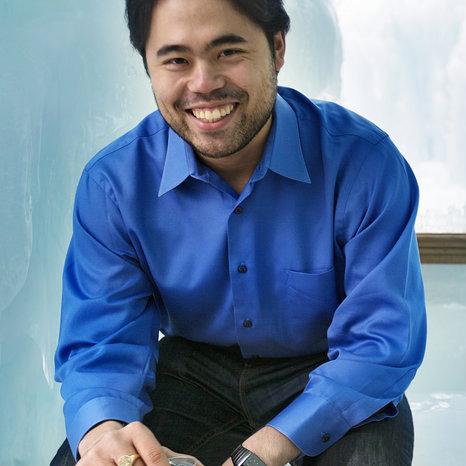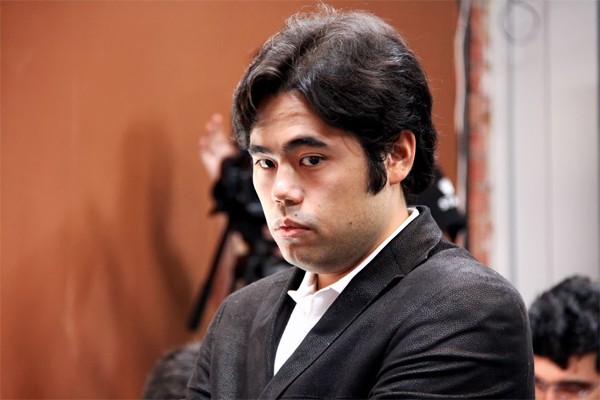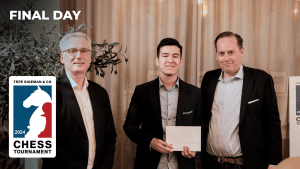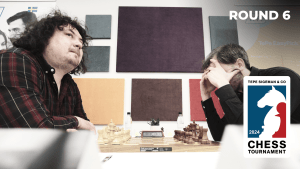
Hikaru Nakamura: “I feel good. I'm optimistic.”
Hikaru Nakamura is an outsider. While others were reading books, he played blitz online. Where others prefer to be quiet, he is fairly outspoken. Where others keep a poker face during games, he often shows his emotions. Less than a week before his next tournament, the Vugar Gashimov Memorial in Shamkir, Azerbaijan the U.S. #1 and #9 in the world rankings speaks frankly about a wide range of topics both on and off the board, including his recently signed contract to be sponsored by the world's largest energy drink distributor, Red Bull.
This interview was conducted on Friday, April 4th - a day after Hikaru had arrived to Italy - in Naples to be exact. That's where his girlfriend Maria De Rosa lives, and so when he's not playing tournaments, that's where is for the most part.
The two aren't living together, though. Nakamura still spends a lot of time in the States (“I am American. I really do enjoy being there as well; there are a lot of great places.”) and is frequently on the road, obviously. “When you're playing chess it's not practical to be living together until you're married,” said the globetrotter. But he surely does like Italy, and loves the food. Shortly after he arrived, on Thursday, he tweeted:
You know you are back in Italy when there is great home made pasta!! http://t.co/3F5vYYjXaR
— Hikaru Nakamura (@GMHikaru) 3 april 2014
De Rosa is a chess player herself - in fact she is the reigning Italian women's champion. She's not a professional player; she works in jewelry, wholesale, design, “a bit of everything.”
“Pretty much from the Turin Olympiad onwards [May 2006 - PD] I told myself I would never go out with a chess player frankly,” says Nakamura. “I didn't think it would be a good thing, in general. I feel like the chess world is really small. When I don't play chess, I don't want to be always talking about chess. I stuck to dating women who were not chess players at all; people completely outside of the game.”
But he has changed his mind. “The biggest advantage to being with someone who plays chess is that they can understand the ups and downs especially. For someone who does not play chess, it's almost impossible to understand the range of emotions you go from during the course of a game, or a tournament, from winning to losing.”

Mental
“Chess is one of those things where it's very difficult to understand it if you don't play. Essentially someone can only understand it based on what you tell them, so it's very difficult to relate to that. Chess is a game and a sport. For example, I do think tennis for example is also very mental. When Federer and Nadal play, they always have an idea of what they're trying to do, they try to think ahead. You can't understand their thought process, but you still can see the shots, it's very visual, so you still are seeing part of the game whereas with chess it's really the exact opposite, with the exception of blitz. The action of moving the pieces is what you see, but you don't see the whole mental side of it. That's the biggest difference.”
Candidates
As the interview took place about a week after the Candidates’ Tournament finished, the first question was logical. Nakamura, who was among the best eight players on rating during the event but failed to qualify, about Anand's victory: “It was a big surprise to me. Not so much from the standpoint of him winning but more from the standpoint that no one else was consistent the way he was throughout the event. I really would have assumed before the tournament that Levon [Aronian] was going to win, because I feel from the start of the year he has played the best, both in Wijk aan Zee and in Zurich. That being said, it's very difficult obviously, everyone is very strong at this level.”
“I felt that Vishy [Anand] played well, I thought he was very solid and played well from start to finish, but I didn't feel that he did anything really spectacular. He took advantage of the few chances that he had and he won those games. That being said, he should have lost to Karjakin; I don't believe that ending was drawn at all. I'm pretty sure that if Karjakin doesn't create the passed h-pawn in that BN vs R ending, one way or another it should be a technical win.”

“I was a little surprised by Vlad [Kramnik] as well. OK, London was a big tragedy for him but I was really surprised about the level of his play. I really was expecting him to be the other main contender to win the tournament. It seemed that he was just all over the place. Up and down, blundering and sometimes playing well... Normally I think if someone is really solid and consistent, he is the prime example for that. It was quite surprising to see. But it happens of course.”
“Also, if you look at Vishy's record lately... If you look at the players he doesn't do well against, the three main players besides Levon were not playing in the event: he has a big minus score against me, against Magnus [Carlsen] in recent times he has a big minus score and also against [Fabiano] Caruana he has a big minus score. So I think he was also a bit lucky that three of the four players who he has done really badly against in recent history, were not playing. But nevertheless, you have to give him credit because no one was giving him a chance at all. Everyone just assumed he was dead and buried basically. But he definitely was the most consistent, and therefore I think he definitely deserves to win the tournament.”
Peak age
Anand qualified for what will be his 6th world title match. It was 19 years ago when the Indian got to play his first, against Garry Kasparov in New York. Even though there is 14 years of age difference between Nakamura and Anand, the latter's victory in Khanty-Mansiysk hasn't changed Nakamura's attitude towards his career. “I really doubt that I will be playing chess past 40, so I don't quite think in those terms. I think with Vishy and also Boris [Gelfand], they're both proving that you can play chess at a very high level even when you're past the traditional peak in you career. It's possible, but for me it's not that big a deal because I highly doubt I will still be playing chess then. ”
“For me, spending my time on chess for thirty years, I feel that is enough time. There are quite a few other things in life besides chess. But that being said, I have no plans whatsoever to stop before I'm 40, so I still have a lot of time. Besides, you never know how many chances you're going to have. It's always important to focus on the near future instead of worrying 15, 20 years down the road.”

Preparing for tournaments
Nakamura's last event was the Zurich Chess Challenge in February, and his next will be the Vugar Gashimov Memorial, which starts the coming Sunday in Shamkir, Azerbaijan. His preparation is not only about pawn pushes and queen maneuvers; psychology is definitely a factor in chess. Nakamura says he has learnt from Zurich: “Being ready and trying to learn from experience is important. Especially for a tournament like Zurich, where the line between a great event and a horrible event was so thin, it's important to try and understand what went wrong there and learn from it.”
Obviously he was referring to the dramatic game with Magnus Carlsen, where he built up a huge attack that should have been winning, only to spoil it - he even lost the game. “It's about trying to deal better with the moment when you're in that situation, and basically you can fulfill exactly what you're trying to do in chess and obviously the goal I think for everyone is to beat Magnus these days. It's just a matter of, when you have those moments, perhaps being more calm, hanging in there a bit better from a mental standpoint. Really, that's the only reason that I didn't win that game. I had a mental lapse. It was unfortunate, but it happens.”
“I was looking at game by Mikhail Tal this morning and he had a position where he was maybe +6 or +7. I am running through this game and I see it's a draw. I go through the move, and suddenly I see this one-move blunder and it goes back to zero. When you see that you realize that it does happen. Even Vishy's game against [Dmitry] Andreikin, where he had +3, +4. It's just about keeping a better perspective.”
Physical preparation
Preparing for a chess event also includes physical exercise. It would be a mistake to only focus on chess while eating pasta! Nakamura: “I play tennis and I have done quite a bit of running on treadmills. About food... well, I am not changing my diet heavily. It actually depends on where I am. When I'm in Italy it's a lot like pasta and pizza, more traditional Italian, but when I'm in America especially I try to eat healthier food as opposed to junk food or fast food. These days I almost never eat fast food.”
“During tournaments, it's more about maintaining energy levels as opposed to being super healthy. On game days I tend to eat things that give you an energy boost. For example, I eat quite a bit of chocolate, some bits before the game or maybe also after. I usually don't eat during games. You won't see me finishing a ham sandwich during a game.”
Red Bull
In this respect, Nakamura's recent sponsor deal with Red Bull seems like a smart move in many ways. The company, which produces the most popular energy drink in the world (with 5.387 billion cans sold in 2013!), recently contacted the American on Twitter. The two parties got together a few times, discussed ways to promote chess and the Red Bull brand simultaneously, some promo pictures were taken and a sponsor contract was signed.

“Yes, it's quite logical actually. First of all it's an energy drink company and with chess, nowadays you certainly have to maintain your focus and your energy levels, so it certainly fits in that regard. In fact I've always liked Red Bull; I have been drinking it sometimes during games.”
“Secondly, I think it's very much of a good fit because if you look at Red Bull, a lot of the athletes they promote and sponsor are not the mainstream athletes. For example, you have a lot of snowboarders, or surfers, or bikers, these sort of sports. It's not European football, or basketball, hockey or football in America what they do; it's a lot of the more minor, lesser known sports and so chess certainly falls into that category. While it is very popular, it is not mainstream. It does makes a lot of sense.”
Sponsors
Not many chess players have sponsors. As the youngest world number one and now the reigning Word Champion, Magnus Carlsen is also famous outside chess, and so it's no surprise that the Norwegian has clinched multiple sponsor deals. But he's an exception; from the world's top twenty, only Sergey Karjakin, Vishy Anand and Anish Giri sometimes wear clothes with branding. Why is that? Nakamura: “The one thing chess very much lacks at the moment is a certain legitimacy. A certain mainstream coverage. There are many reasons for it, but this is how it is. I think working with Red Bull might give chess more exposure; it's a first step in changing the image.”

Rapid chess
Another step might be to change chess itself - or rather, its pace. Tournament games might last between three to seven hours, which is not too convenient to cover live. Itsn't it about time that the chess world starts focusing on faster forms? Nakamura thinks so: “I've always been a fan of rapid, blitz and also Chess960. I think classical chess, in terms of the World Championship, should always be there - certainly for the ratings; it's the way how the system has been established. But I do think that if we're trying to raise the profile, rapid especially is much more interesting. For someone who is not a hardcore chess fan, it's very hard to follow a game for six hours. I think rapid, where the game can go roughly from half an hour to an hour, is much better for spectators. For them it's better to have more rapid events than classical; in terms of making chess more mainstream, rapid chess is the future.”
Another way of trying to make the royal game more popular is to focus on kids. More and more chess in schools projects are popping up in European countries, and also in the States things are moving. Last month Nakamura was in Sunrise, Florida making a few appearances at local events. “They are trying to get chess into the curriculum of all elementary schools. I played some games against kids, did some signing, that kind of thing.”
While there, he also attended a Florida Panthers hockey game. “The owners of the team are big fans of chess, and some of the employees of the company play chess. I read in a magazine that sometimes, when they do job interviews, they ask if someone plays chess and if the answer is yes, they will get one of the traders to check whether it's true!”
Other sports
Nakamura is known to be a fan of hockey, but he also likes tennis and soccer. Does he ever get inspired by other sports, or athletes? Can he pick up things that might benefit his chess? “Tennis will always be my favorite sport. It's the one sport that I have done myself; I took lessons for seven or eight years and I've played quite a bit. So it's the one sport that I understand better than other sports. Another reason I use it as an example is because it's individual. It's adversarial, it's one against one, you have to beat the other person.”
Nakamura read quite a few books by top tennis players, for example Jimmy Connors and John McEnroe. What did he pick up from that? “I think the main thing is to try and understand the mindset that these other athletes have. Their approach. Also for chess, at the top level it's very much about the mindset, and the mentality and the approach you have rather than just the pure talent that you possess.”
Outsider
“What I really liked from the Connors book - which is called The Outsider, by the way, is... well, obviously I am American, for starters. But I feel like in many ways, when it comes to chess, I am an outsider. I don't think I belong to the traditional clique in chess. Much of my game is from playing open tournaments in the U.S. It's not from growing up in Europe and playing round robins and the like. It's very much the mentality ‘you have to win at all cost, draws are not OK, you have to win tournaments’. I feel very much like that.”

“Another thing I really liked about that book is that... There are many people who don't like me in the chess world, as I'm well aware of. I think that's in large part because I'm fairly outspoken. I'm not traditional, I'm not quiet about things. Some things written by Connors and McEnroe resonate with me; they very much sound like me, like the way that I feel.”
“For example, at one point Connors was playing against Borg, another Scandinavian guy of course. He's playing at the U.S. Open and people are not rooting for him, they are rooting for Borg. I thought to myself: that sounds like me. There are people who are not rooting for me who are Americans. It's a lot of little things like that. It's more about being American; it's everything as a whole. All this mental stuff is very similar.”
In fact Nakamura can be called an outsider for another reason. Instead of studying lots of books or getting strong coaches, America's number one player became a grandmaster while spending most of his time playing blitz chess online. Although there are more and more examples of players who have developed their talent mainly from playing on the internet (the strongest player from the Philippines, Wesley So, comes to mind) Nakamura was one of the first, growing up right at the start of the whole internet boom. And he sees some advantages in that. “Because the approach is so different, you're much more open. You're not as rigid in terms of the way you play the game. Now it's a different time, but I'm probably the first of many who will become like that.”

Draw
In chess, many times a draw is a fine result. A lower rated player might be playing a strong opponent, a tournament leader might want to consolidate his lead, things like that. But, as mentioned earlier, Nakamura is the kind of player who almost always plays for a win. In that sense, he belongs to a small minority of top chess players who fight till the bitter end. In the world's top 10, only Magnus Carlsen and Veselin Topalov are good examples, and especially for the latter it has become some sort of trademark.
“The simplest way for draws not to happen is to have higher prizes, to have bigger incentives frankly. That alone will take care of the issue. At least that's what I believe. Look at the Candidates’. There the prize for winning the tournament was really high: you would qualify for a world championship. That's why you didn't really see those boring games that end in draw on move thirty.”
“In general I don't think draws are a big problem. If it happens in one game it's not a big deal; it's when it starts to happen consistently, then you're going to have a problem. In that respect I don't really like the thirty-move rule; it takes away from the natural flow of the game. Draws are part of the game whether you like it or not. When you have rules that try to take away draws, it also affects the quality of the game because sometimes the best move are repetitions, or sometimes the best move is to steer the game into a more drawish position.”
Emotions
If we continue the theme of 'outsider' just a little longer, there is one more characteristic of Nakamura that you won't see with many of his colleages: he tends to show his emotions during a game. Especially when things go wrong, he can be seen showing clear facial expressions or other body language, up to the point where it might give away information to the opponent. But Nakamura doesn't mind. “It's not such a big deal as long as you're still going to find the best moves. In that respect I agree with Fischer.”
“The only way I think you can be giving away too much information is when your expressions make your opponent more confident. Outside of that there is no reason for hiding your emotions. In fact I think it's better to be emotional, it's better to show some passion for what you're doing. That's just how I am. If you're not going to be passionate, if you're not going to show emotion and not really care about it, what's the point of playing?”

Gashimov
On Sunday Nakamura's next tournament starts, and it's a special one. It commemorates Vugar Gashimov, one of Azerbaijan's top grandmaster who passed away in January at the age of 27. “The only time I had a chance to talk and hang out with him was in 2012 in Wijk aan Zee. That was his last tournament, and in fact we played in the last round. I didn't know him super well, but I was very aware of his games and his style. He also played a lot of games on the internet. I think we played a few hundred games over the years.”
“It's really a big tragedy to lose someone so talented at such a young age. It puts everything in perspective, when you hear about stories like that, see things like that happen. I think that's also why you have to make most of the opportunities you have. I think Vugar definitely did. He had long-term health problems and he was still competing at a very high level; he was one of the absolute best in the world. I would certainly not be able to do that. I think it speaks a lot to the person he was, to his ability and to his approach to everything, to be that good.”

“It's very good that he's being recognized with this tournament. There are a lot of players who were great but didn't get the recognition. Especially for him, coming from Azerbaijan and being the national sports hero that he was there, it's very good that there's something to honor him, honor his memory, honor who he was. At the end of the day that's the most important thing, more so than the chess. He was a great person who did a lot with the short time he had on this earth.”
But besides keeping the memory of Vugar Gashimov alive, Nakamura definitely intends to play well in Shamkir - better than in Zurich. ”I think in Azerbaijan I will be better prepared. I feel good, better than I did going into Wijk aan Zee and Zurich. I'm optimistic.”


